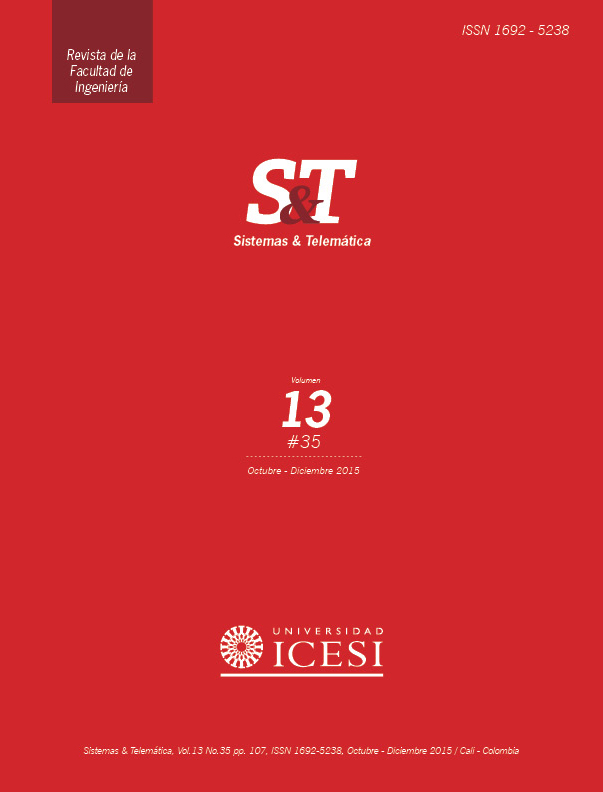Inference model for dynamic classification of monographs at university level
DOI:
https://doi.org/10.18046/syt.v13i35.2150Keywords:
Inference, knowledge base, monograph, ontology, predicate logic.Abstract
The inappropriate visibility of degree documents in monograph mode prevents new members of the academic community from querying and accessing them, significantly limiting the possibility of giving continuity and complementing versions of already completed work, such as applying the results both industrial and socially. This article proposes a knowledge base model supported on ontology to improve the relevance of documents in the digital level as a result of a search on specific interest aspects. To produce new knowledge, predicate logic is used and applied to the ontological model of the representation of monographs, in order to establish dynamic and reliable inferences or to make changes in situations where required.
References
Alonso, M. (1992). Conocimiento y bases de datos una propuesta de integración inteligente [thesis]. Universidad de Cantabria: Santander, España.
Beekman, G. (1999). Introducción a la computación. Madrid, España: Pearson.
Citycorp. (2015). Semantic solutions for your enterprise. Retrieved from: http://www.cyc.com/enterprise-solutions/solutions/
Cybertesis [web site] (2015). Retrieved from: http://cybertesis.unmsm.edu.pe/
Dentler, K., Cornet, R., Teije, A., & Keizer, N. (2011). Comparison of reasoners for large ontologies in the OWL 2 EL Profile. Semantic Web, 2(2), 71-87.
Díez, D. & Zúñiga, A. (2011). Implementación de un modelo de gestión del conocimiento para empresas de servicios [thesis]. Cali, Colombia: Universidad ICESI.
Flores, I. (2011). Introducción al razonamiento sobre ontologías. Retrieved from: file:///C:/Users/Jos%C3%A9%20Ignacio/Downloads/nota-docencia-9.pdf
Floridi, L. (2004). Open problems in the philosophy of information. Metaphilosophy, 35(4), 554-582.
Gangemi, A., Pisanelli, D., & Steve, G. (1998). Ontology integration: Experiences with medical terminologies. In Formal ontology in information systems [Vol. 46]. Amsterdam, The Netherlands: IOS.
Gruber, T. (1995). Toward principles for the design of ontologies used for knowledge sharing. International Journal of Human and Computer Studies. International journal of human-computer studies, 43(5), 907-928.
Hao, C. (2011). Research on knowledge model for ontology-based knowledge base. In 2011 International Conference on Business Computing and Global Informatization (BCGIN), (pp. 397-399). IEEE.
Hendler, J. (2001). Agents and the semantic web. IEEE Intelligent Systems, 2, 30-37.
Holmes, D. & Stocking, R. (2009). Augmenting agent knowledge bases with OWL ontologies. 2009 IEEE Aerospace Conference. doi:10.1109/AERO.2009.4839651
Lahaba, N. & León, M. (2001). La gestión del conocimiento: una nueva perspectiva en la gerencia de las organizaciones. Acimed, 9(2), 121-126.
Lenat, D., & Guha, R. V. (1990). Cyc: A midterm report. AI magazine, 11(3), 32.
Márquez, S. (2007). La web semántica [thesis]. Universidad Politécnica de Madrid, España.
Moldovan, D. I., & Rus, V. (2001, May). Transformation of wordNet glosses into logic forms. In FLAIRS Conference Proceedings, (pp. 459-463).. Retrieved from: http://www.aaai.org/Papers/FLAIRS/2001/FLAIRS01-088.pdf
Mylopoulos, J., & Levesque, H. (1983). An overview of knowledge representation. In GWAI-83 (pp. 143-157). Berlin-Heidelberg, Germany: Springer.
Noy, N., & McGuinness, D. (2000). Ontology development 101: a guide to creating your first ontology. Retrieved from: http://liris.cnrs.fr/~amille/enseignements/Ecole_Centrale/What%20is%20an%20ontology%20and%20why%20we%20need%20it.htm
Ono, K., Kawano, S., Fukazawa, Y., & Kadokura, T. (1992). A resolution method from predicate logic specification into executable code. In Proceedings of the Twenty-Fifth Hawaii International Conference on System Sciences, 1992. (Vol. 2, pp. 480-487). IEEE.
Parnas, D. L. (1993). Predicate logic for software engineering. Software Engineering, IEEE Transactions on, 19(9), 856-862.
Ramírez, S., Alonso, Y., Hernández, V., Arias, A., & La Rosa, D. (2010). Comparando UML y OWL en la representación del conocimiento: correspondencia sintáctica. Revista Española de Innovación, Calidad e Ingeniería del Software, 6(3), 84-94
Repositorio Unilibre [web site] (2015). Retrieved from: http://repository.unilibre.edu.co/handle/10901/1
Ruckhaus, E. (2005). Lógicas descriptivas y ontologías. Retrieved from: http://ldc.usb.ve/~ruckhaus/materias/ci7453/clase51.pdf
Shi, Z., Liu, Z., & Chen, J. (2010). Using logic rules for concept refinement learning in first order logic. 2010 IEEE Fifth International Conference on Bio-Inspired Computing: Theories and Applications (BIC-TA), (pp. 444-448). IEEE.
Sinab [web site] (2015). Retrieved from: http://www.sinab.unal.edu.co/
Tayal, M., Raghuwansh, M., & Latesh, M. (2013). Knowledge representation: predicate logic implementation using sentence-type for Natural Languages. Circuits, Power and Computing Technologies (ICCPCT), (pp. 1264-1269). IEEE.
Teseo [web site] (2015). Retrieved from: https://www.educacion.gob.es/teseo/irGestionarConsulta.do
Universidad del Rosario (2011). Reglamento de trabajos de grado de la facultad de jurisprudencia. Retrieved form: http://www.urosario.edu.co/jurisprudencia/pregrados/documentos/Reglamento_de_trabajos_de_grado_Jurisprudencia.pdf
Wang, Y. (2010). Research on the construction of ontology-based criminology knowledge base. 2nd IEEE International Conference on Network Infrastructure and Digital Content.
Wang, Y. (2010). Research on the construction of ontology-based criminology knowledge base. In 2010 2nd IEEE International Conference on Network Infrastructure and Digital Content, (pp. 123-128). IEEE.
Yoo, S., & Park, C. H. (1993). An inference browser to verify knowledge bases. In Fifth International Conference on Tools with Artificial Intelligence, 1993. TAI'93. Proceedings., (pp. 466-467). IEEE.
Downloads
Published
Issue
Section
License
This journal is licensed under the terms of the CC BY 4.0 licence (https://creativecommons.org/licenses/by/4.0/legalcode).



